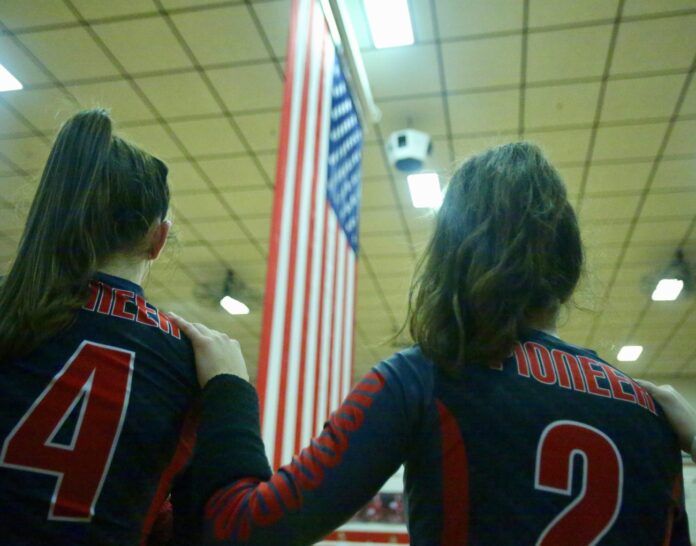MISSION — When Sharyland High School senior Chase Gerlach graduates this spring, he and the rest of the class of 2020 will have a particular distinction: they will be the first American adults born after the 9/11 terrorist attacks, the first whose knowledge of the tragedy comes strictly from their parents and teachers, from museums and documentaries, and even from YouTube videos.
Gerlach, 17, was born in July 2002, 10 months after the attacks. Even though he was born almost a year after the tragedy, Gerlach can remember hearing about it for the first time.
“I remember my dad talking to me about it,” Gerlach said. “He was actually building a Boy Scout workshop with my grandpa and they had a TV set up in there, and he remembers that they had the TV on the news. And all of the sudden everything just went crazy, and they switched the channel and the twin towers were falling down.”
Gerlach says his parents made clear to him the significance of the attack, in which nearly 3,000 people were killed on Sept. 11, 2001, when planes flew into the World Trade Center towers in New York City, into the Pentagon, and was forced down in Shanksville, Pennsylvania.
“I remember my mom telling me that my dad didn’t want to have a kid afterward. He said, ‘Why would we want to bring kids in a world like this with terrorists attacking our country?’” Gerlach said.
Gerlach’s social studies teacher, Roberto Barbosa, said many members of the post-9/11 generation first learn about the attacks through their parents, while history and social studies teachers are usually the next step in students understanding its significance.
For some, their awareness came in the classroom.
Sophomore Sharyland Pioneer students Thalia Ochoa and Elizabeth Fina, both 15, recall being told about the attacks in the first grade.
“I remember my teacher telling me she remembers exactly where she was, and they’re just days like those you’ll never forget,” Fina said.
The state mandates that Texas history teachers teach their students about the attacks and the aftermath. Barbosa said he makes an effort to also instruct his students on the events leading up to the attack, like the 1998 U.S. embassy bombings and the bombing of the USS Cole.
“In our special topics in social studies class we cover modern American combat, and we cover everything from World War I to the War on Terror, so in that class the kids get a two-week unit on the War on Terror,” he said. “A lot of the students know about it, but they don’t realize how widespread the impact from it is. Some of them have been to the memorial site, and they know about the deaths. They know about the event, but they don’t know how impactful it is … especially the impacts of the Patriot Act, which expanded the power of the government and combined agencies that had existed separately before.”
Barbosa’s students are learning about 9/11 during an interesting time in the memorializing of the attacks. Nationally, politicians are lambasted for paying too little attention to 9/11.
Editorials and opinion pieces also decry that the lessons learned from the atrocities are being forgotten. This summer, comedian Jon Stewart emotionally chided Congress for ignoring first responders during a hearing on reauthorizing the 9/11 Victim Compensation Fund.
Barbosa says he doesn’t think the post-9/11 generation will forget the tragedy. On Wednesday, during the 18th anniversary, it will be commemorated at Sharyland High with a moment of silence and a short video about the attacks.
“It’s seen more as a historical event,” Barbosa added about a shift he’s observed in the way Sept. 11 is perceived by his students over the last eight years. “It’s kind of the way people view Pearl Harbor today versus the way our grandparents and great-grandparents who lived through the event viewed it. It’s something symbolic that they hold dear.”
Barbosa said learning from the event could be as important as memorializing it.
“I think it’s especially important that we cover it because it’s the first generation that we’re teaching that’s a post-9/11 generation,” he stressed. “It’s significant because they learn the lessons of the failures in intelligence that led up to the attacks — how a lot of the things that caused 9/11 existed long before it happened, and instances where the United States could have acted but acted in a very limited fashion, like after the embassy bombings, which kept Al Qaeda in power where they were at.
“History tends to repeat itself.”
Despite 9/11 being increasingly viewed through a historical lens, the tragedy has continued to resonate with the generation born afterward.
Sharyland senior Jose Cubaque, 17, is another of Barbosa’s students born after the attack.
Cubaque immigrated to the United States in the third grade and didn’t fully appreciate the significance of the date until a trip to New York five years later.
“When I was in junior high I went to New York and to the memorial where they had the towers and saw all the names,” Cubaque said. “All of them were innocent. They didn’t deserve to have their lives taken away just because of their beliefs. It made me think a lot.”
Monitor staff writer Raul Garcia contributed to this report.




